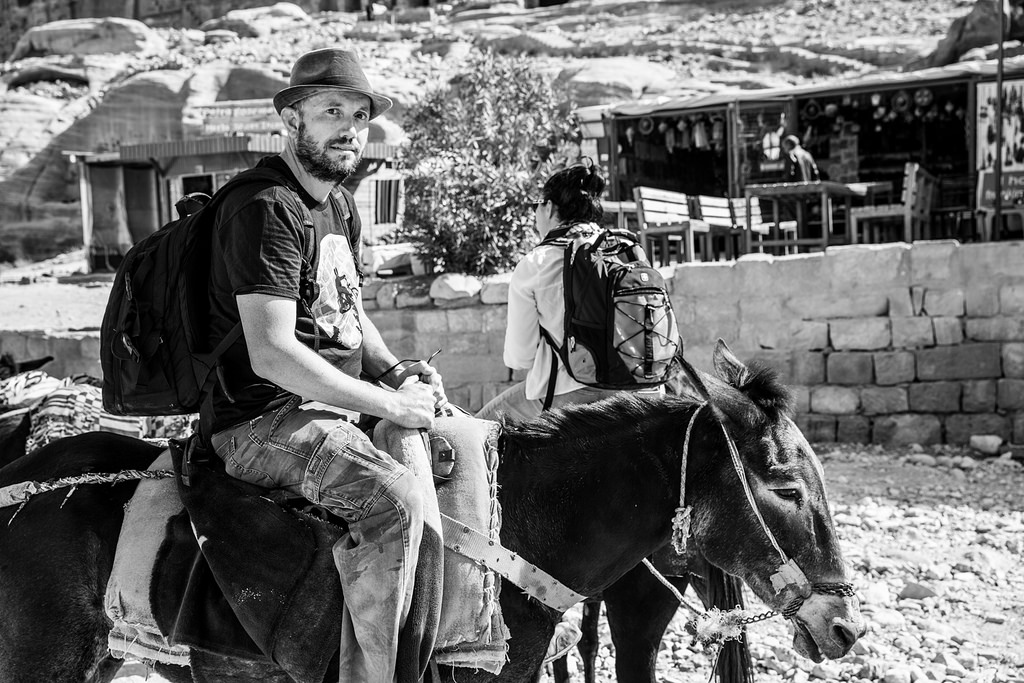If you follow my wife Jessica or our friend Angie on Twitter, then you know about their brand new online book club. If you hadn’t heard, then you should know about it. More than a 1000 women have joined the first read.
The name of their book club is Bloom. And they’ve started a Ning community for discussion.
The first book club selection is Crazy Love by Frances Chan. Each week Jessica and Angie are inviting writers, bloggers, and pastors to join in the discussion.
I was chosen for Week Two.
If you desire to catch up on the discussion, click here. To listen/watch Pete Wilson’s part of the discussion, click here.
Of course, I assume that Chan wants me to do this so I can “see” how small and insignificant I am. It’s been my experience that pastors like making us lay-people become overwhelmed by how short (and seemingly irrelevant) our lives are in the grand scheme of God’s plan. And for a little while, I think my theory about what Chan is doing is correct. “He’s going to leave me feeling depressed about how puny I am in God’s eyes,” I think.
However, thankfully, I’m wrong. Chan wanting me view God’s “bigger picture” isn’t only about me seeing how fragile and short life is, he also wants me to consider how I’m engaging my role as an “extra” with a small part in the movie that God is making.
Now, I’ve heard this “God’s Movie” analogy before. Passion leader Louis Giglio tell a story about meeting a guy in a movie theater who had a small bit in the movie they were seeing. Louis related his new friend’s excitement for having a very small/hardly noticeable role in a movie to our excitement for being in the movie God’s making. It was a great talk, and I liked the picture/story it painted.
But more than what Chan wrote in chapter 2, I was more moved when I considered the words of James
How do you know what your life will be like tomorrow? Your life is like the morning fog—it’s here a little while, then it’s gone. (New Living Translation)
The King James Version translates “morning fog” as vapor–if you’ve been in church for any length of time, you’ve probably heard many occasions that you’re life is a vapor. In other words, like I wrote earlier, our lives are short, fragile, can be here one moment and gone the next. but he wanted us to envision our time here on earth as delicate and intangible, something that is in God’s hands and not our own.
But why is James telling us that our lives are a vapor? In the verse 13, James writes:
Look here, you who say, “Today or tomorrow we are going to a certain town and will stay there a year. We will do business there and make a profit.”
Whoever James is writing these words to, I understand their life’s perspective too well. I can’t tell you how often I get caught up in “planning” what will happen tomorrow. And I’m pretty sure James isn’t saying that it’s wrong to make a to-do lists. I think he’s talking about people who live for tomorrow or next year or ten years from now. I don’t know about you, but I’m so guilty of forsaking “life” today for the hope of “better life” tomorrow.
James goes on to say that this kind of living is full of pride and “self-fulfillment.”
In verse 15 and 16, he writes:
What you ought to say is, “If the Lord wants us to, we will live and do this or that.” Otherwise you are boasting about your own plans, and all such boasting is evil.
I’m not sure about you, but I have done my share of “evil boasting and planning.” I am guilty of pridefully thinking that I am in control of my own destiny. Most of the time, God will eventually wake me up to my selfish living. But sometimes it’s a slow process.
A couple years ago, I wrote a book called Hokey Pokey: Curious People Finding What Life’s All About. (Okay, don’t laugh; yes, I know now the title is awful!) Here’s a short excerpt from the final chapter of that book.
I tend to think that most of us have learned (the hard way) that our stories are fragile, just as we learn that glass is fragile—when it shatters. And while we try to protect ourselves from danger, we learn very quickly that we can’t, that we’re not in control. That truth scares us at times and invigorates us at others, but most of the time, we have to admit that we’re not sure what we’re supposed to think about all of it. We want to trust that God is the one who is in control, but then we turn on CNN and our theories tend to go out the window. You know what I mean? I don’t believe anything messes with a person’s ability to trust in God like watching the media’s coverage of war.
As we get older and experience more of our story, we also become fully aware of our own personal humanity. In other words, we know what’s really going on inside of us. While our families and friends may not know what we battle, we do. And we think to ourselves, if God can’t get his hands around our fears, our addictions, or our sins, then how in the world can we believe that he’s capable of taking care of our stories. That’s a valid question, I believe—a question that can make faith difficult, make the Christian life difficult to live.
A lot of us have divided hearts—we fight a war between faith and logic, God and culture. The culture most of us live in teaches us that our stories have to be read a certain way. Usually, the stories that are told by the media are those of the wealthy, the intelligent, the sexy, the talented, and the revered. But if those are the only “successful” storylines, what does that mean for the majority of us? What if we can’t find a job? What if we’re homely or fat? What if our only talent is playing video games? I mean, is there a successful storyline for the jobless fat guy who kicks butt at Halo?
It’s really no wonder so many of us are investing our time and effort into “making it.” Instead of living the stories that God designed us for, we settle for the generic ones—the ones advertised on TV, the Internet, and in the education systems. We buy into the “generic” stories but end up realizing—often, when we hit middle age—that the life we’re living isn’t the one that was advertised. We don’t realize where exactly things went wrong; we just assume that the truth was somewhere in the fine print. And we didn’t read it.
Since we were kids, we’ve told that “normal”—whatever that means—will make us happy. Most of us, at some point in our lives, have fallen for the lie that says: the “good life” comes when we have a high-paying job, a house we can call our own, a decent 401k plan, stock options, a car that doesn’t embarrass us in front of our friends, a couple of kids, and a spouse who doesn’t hate us. And what if we are fortunate to get everything on that list? Is there any one of us who could keep something like cancer or a drunk driver or a found-out secret from taking it all away?
Our stories were never meant to be generic. We were never meant to follow the ways of culture and pursue the easy thrills of 21st century “success.” While on earth Jesus talked about a higher calling. He talked about a foolish route. He said that we would know we were on the right path if it was sometimes lonely. But he also said that the “narrow path” would ultimately lead us toward spiritual fulfillment. Jesus said, “What shall it profit a man if he gains the whole world but loses his soul?” It wasn’t a “balanced” life that Jesus talked about; it was pretty much a preposterous life. He asked his followers to scrape against the grain of the social norms, and to do it with passion, love, mercy, and forgiveness. It takes a curious soul to even consider discovering what Jesus believed life was all about.
If the truth were known, most of us just want a little security. The emotional kind. The spiritual kind. The physical kind. And how does security come about? Well, I think we learn these things by living. In other words when we live, we realize that God has a role for us in this story that he’s writing here on earth. That’s what life is all about, isn’t it? To be a part of his story. To be certain that he is holding tightly to our personal narratives.
And this is what I’ve come to know: Even when I doubt, my unbelief doesn’t mean that God isn’t still there, holding me and guiding my story. And you know, sometimes that makes all the sense in the world and other times it feels like something from Aesop’s fables. For a long time I would have never known the kind of freedom to suggest that I go through times of unbelief. But I’ve learned that sometimes unbelief is a thread in my story of faith. It doesn’t mean that my faith has disappeared.
This life we live is a journey. It’s a journey that will have many seasons, some when I feel like I am close to God, others when I feel like I am dragging behind him, and still some when I have no clue where God is in my story. That’s the story we read over and over again in scripture, a rocky narrative that isn’t perfect or ideal or magical. But it is a story about faith. The men and women curious enough to hold onto faith, eventually began to see what life’s all about.
The hope in that message—God will be my foundation—is somewhat similar to God’s reminder to my friend Devon, that he was God’s art. I love the imagery of that phrase. For me, it potentially sheds a little light on what we find out about God in the first chapter of Genesis—the part where we learn that we are made in God’s image.
But I also know that my story will always be in process. There will always be something that I don’t understand. There will always be a part of my journey that I will have to leave in question. But I know this: I don’t want to be that person who demands to be completely painted before I am willing to participate in the “hokey pokey.” I want to dance. I want to do it the way God created me to do it. I want to have fun with it. I want to add my own color to it. I want to put my body in and shake it all about.
To a large degree, that’s what life’s all about.
Questions to Consider:
Do you engage the story of God on daily basis?
If no, what keeps you from doing that?
If yes, for you, what does that look like?
Viagra is for the treatment of inability to get or keep an erection and similar states when hard-on is of low quality. When you buy remedies like cialis from canada you should know about cialis online canada. It may have a lot of brands, but only one ATC Code. Erectile malfunction, defined as the persistent impossibility to maintain a satisfactory erection, affects an estimated 15 to 30 millions men in the America alone. Sexual soundness is an substantial part of a man’s life, no question his age etc.






Greta thoughts!
I read the whole book during 2 days of a youth conference where my “day job” had a booth at..
Great things in here!
I am also thankful for your wife linking to the lady who was giving away the book..b/c that is how I got it!
I’m trying harder to engage the story of God on a daily basis. I feel that if who God is who I say he is then why am I not sharing this story more and why am I not allowing my Director to do what He knows is best for the whole movie and for me as an individual in the movie?
Thanks for your thoughts!
Hi Matthew, You have a very nice blog here. You may also enjoy the many testimonies of our Lord and Savior Jesus Christ at http://wetestifyofchrist.blogspot.com. God bless!
great post! very insightful and honest. i enjoyed reading it. thank you!
This was a great post, I read chapter two, put the book down and I am still thinking about it. Now I have to start chapter three! Thank you for your thoughts. Our life is a journey of faith..
dang. it.
i have to follow this???
=o
[While on earth Jesus talked about a higher calling. He talked about a foolish route. He said that we would know we were on the right path if it was sometimes lonely. But he also said that the “narrow path” would ultimately lead us toward spiritual fulfillment. Jesus said, “What shall it profit a man if he gains the whole world but loses his soul?” It wasn’t a “balanced” life that Jesus talked about; it was pretty much a preposterous life. He asked his followers to scrape against the grain of the social norms, and to do it with passion, love, mercy, and forgiveness. It takes a curious soul to even consider discovering what Jesus believed life was all about.]
Thanks so much for writting this! I’m defintly at a very lonel point in many ways. I pray that God leads me to where I need to be.
Thanks for taking the time to share with us 1000+ ladies who are reading Crazy love. We are vapor no matter how we want to see it and I think that there is definitely a balance to daily living, planning and following Him to wherever He might have us go. I am hoping that as i pursue a more passionate daily walk with Him it will not matter what tomorrow holds because I will be full of my mission from Him for today.